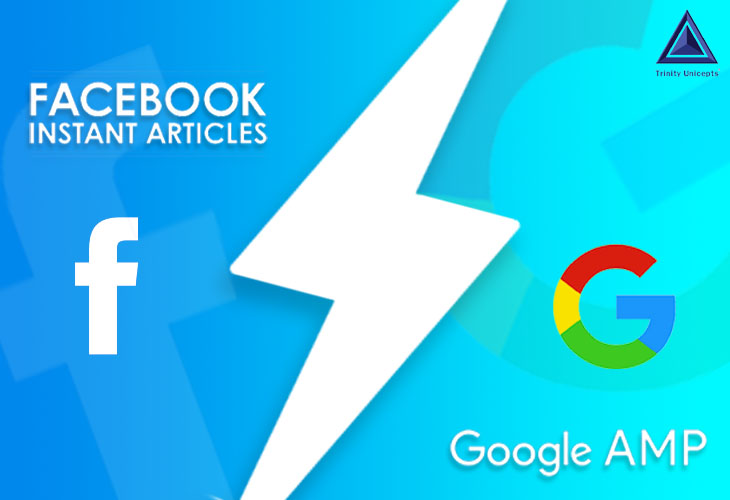Google AMP and Facebook Instant Articles- Everything You Need to Know About It
It is very important to know some facts about Google AMP and Facebook Instant Articles, Here you will find interesting information along with Pros and Cons related to Google Accelerated Mobile Pages and Facebook Instant Articles.
Facebook Instant Articles and Google AMP.
Digital advertising has reached its summit with Google and Facebook advertising. Also, it’s no secret that mobile phones have surpassed desktops. Therefore improving the mobile users’ experience had become a priority in 2015 with Facebook launching its fast-loading Instant Articles, followed by it, Google launched its Accelerated Mobile Pages in 2016. The goal of both Facebook Instant Articles and Google AMP was to make web pages load faster.
Why was there a need to improve the speed of the webpages?
People using devices like mobile phones or tablets experienced slow-loading pages and often, the pages would function erratically. The reason for this was because of two main reasons:
Third-Party Interference:
The running ads and its tracking techniques added to the weight of already voluminous CPU driven devices and the pages convulsed with the multiple commands of document.write()
Damage from responsive websites:
Most mobile responsive websites looked okay on all screen sizes, but they often carried the baggage of desktop websites when viewed on a mobile phone.
According to Facebook, the loading time for an article took 8 seconds, but with Facebook Instant Articles, the articles started loading ten times faster than the standard mobile web articles. Instant Articles lets publishers provide the similar quality, enjoyable experience and interactivity that the audience expects from an app.
Facebook Instant Articles are in-app experiences, whereas Google AMP is wholly browser-based.
How is Google AMP different from Facebook Instant Articles?
- In-app experiences:
Facebook Instant Articles can be accessed through Facebook on mobile devices. It doesn’t allow users to view articles outside its app but only allows them to view articles in its specific format only.
- Experience:
Facebook Instant Articles is focused on performance, along with making articles look and feel modern. It has the elements that allow the polished and smooth interaction we associate with the reading experience.
Whereas Accelerated Mobile Pages have focused on distinct purposes:
Web-based:
AMP documents are designed to be displayed either in the browser or web views.
Performance directed:
AMP is more concerned about the functioning of AMP documents than about creative designs or interaction styles. Having said that, it isn’t AMP documents are ordinary, they too can be as captivating as Facebook Instant Articles. But the primary concern of AMP is to have the documents rendered quickly rather than providing elaborate visual effects.
Segmented documents:
AMP documents are verified, parsed and partly displayed by the AMP runtime. AMP documents are independent and stay on the web server rather than be a collection of metadata that may be transformed into articles and published in apps.
What is the role of AMP and FIA in advertising?
AMP articles load 4x faster than standard web pages, i.e., in 1.4 seconds and use 10x reduced data.
And as already stated above, Facebook Instant Articles load 10x faster, i.e. in 0.001 seconds and they are 30% likely to get shared and 70% less likely to get deserted.
Depending on the various reasons, you can gravitate either to AMP or FIA for your mobile marketing strategy.
Pros of AMP:
- The users get more exposure as AMPs get displayed in a carousel on SERPs.
- The AMP symbol, which is of a lightning bolt persuades more people to click and read.
- AMP articles are viewed 3x more than Facebook Instant Articles daily.
- AMP is open source and has collaborated with various other prominent platforms that include LinkedIn, Twitter, Reddit, Pinterest, Bing, Tumblr, Flipboard and WordPress.
- The AMP validator tool helps identify and remove any errors from the mobile pages, thus making them acceptable for AMP.
Cons of AMP:
- As AMP pages are tracked differently than regular mobile pages, tracking AMP metrics can be hard as only a few analytics platforms support the framework.
- Implementation of AMP isn’t easy. Although some Content Management Systems like WordPress have AMP tools integrations available, they often clash with essential SEO tools like Yoast.
- As Google serves a cached version of an AMP page to its users, it makes the pages load faster.
Pros of FIA:
- FIA offers custom themes that mirror the identity of the brand and allow publishers to post branded content.
- An AMP Support Extension was added by Facebook to build Instant Articles. Therefore people can easily convert FIA into AMP.
- The publishers can manage FIA from their existing content management systems.
- Instant Articles can include an implanted email lead capture field and other related content at the bottom.
Cons of FIA:
- Publishers have found it challenging to fit Instant Articles into their business models.
- Facebook takes 30% of the profit when publishers use the Audience Network to earn revenue via ads.
- FIA’s use has deteriorated due to its adamant need to prioritise video over text articles in its news feed.
- Facebook is a social platform and its primary goal is to get users to spend more time inside the app, so it mostly shows posts from friends rather than publishers.
- Since FIA are opened directly into the Facebook app, it cannot be redirected to your landing page, which limits their experience with your brand.
Google AMP and Facebook Instant Articles both have their share of advantages and disadvantages. Despite the few defeats, AMP and FIA are finding ways to improve users’ mobile experience by delivering fast-loading mobile pages.
Though seeing the fact that AMP works over with over 2 billion web pages directly gives it a cut over Facebook Instant Articles. However, an average person spends five years of his life on Facebook, which means Facebook Instant Articles have the chance in marketing.





